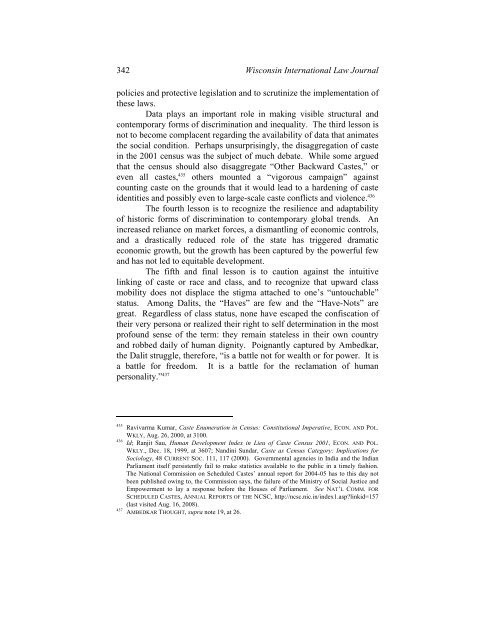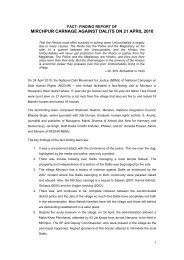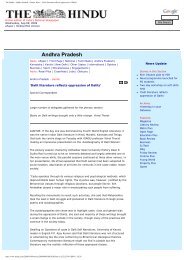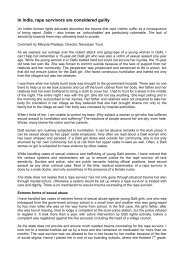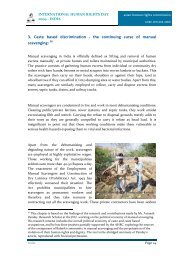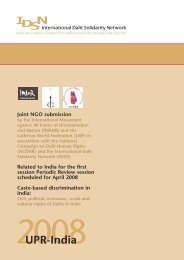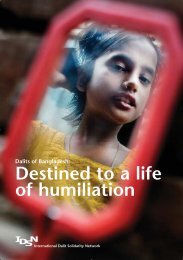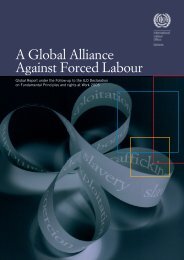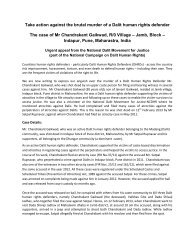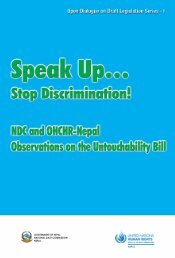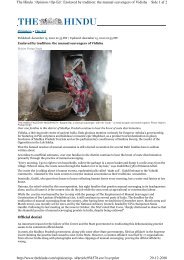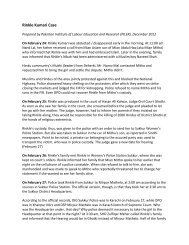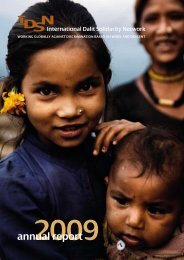equal by law, unequal by caste - International Dalit Solidarity Network
equal by law, unequal by caste - International Dalit Solidarity Network
equal by law, unequal by caste - International Dalit Solidarity Network
You also want an ePaper? Increase the reach of your titles
YUMPU automatically turns print PDFs into web optimized ePapers that Google loves.
342 Wisconsin <strong>International</strong> Law Journalpolicies and protective legislation and to scrutinize the implementation ofthese <strong>law</strong>s.Data plays an important role in making visible structural andcontemporary forms of discrimination and in<strong>equal</strong>ity. The third lesson isnot to become complacent regarding the availability of data that animatesthe social condition. Perhaps unsurprisingly, the disaggregation of <strong>caste</strong>in the 2001 census was the subject of much debate. While some arguedthat the census should also disaggregate “Other Backward Castes,” oreven all <strong>caste</strong>s, 435 others mounted a “vigorous campaign” againstcounting <strong>caste</strong> on the grounds that it would lead to a hardening of <strong>caste</strong>identities and possibly even to large-scale <strong>caste</strong> conflicts and violence. 436The fourth lesson is to recognize the resilience and adaptabilityof historic forms of discrimination to contemporary global trends. Anincreased reliance on market forces, a dismantling of economic controls,and a drastically reduced role of the state has triggered dramaticeconomic growth, but the growth has been captured <strong>by</strong> the powerful fewand has not led to equitable development.The fifth and final lesson is to caution against the intuitivelinking of <strong>caste</strong> or race and class, and to recognize that upward classmobility does not displace the stigma attached to one’s “untouchable”status. Among <strong>Dalit</strong>s, the “Haves” are few and the “Have-Nots” aregreat. Regardless of class status, none have escaped the confiscation oftheir very persona or realized their right to self determination in the mostprofound sense of the term: they remain stateless in their own countryand robbed daily of human dignity. Poignantly captured <strong>by</strong> Ambedkar,the <strong>Dalit</strong> struggle, therefore, “is a battle not for wealth or for power. It isa battle for freedom. It is a battle for the reclamation of humanpersonality.” 437435 Ravivarma Kumar, Caste Enumeration in Census: Constitutional Imperative, ECON. AND POL.WKLY, Aug. 26, 2000, at 3100.436 Id; Ranjit Sau, Human Development Index in Lieu of Caste Census 2001, ECON. AND POL.WKLY., Dec. 18, 1999, at 3607; Nandini Sundar, Caste as Census Category: Implications forSociology, 48 CURRENT SOC. 111, 117 (2000). Governmental agencies in India and the IndianParliament itself persistently fail to make statistics available to the public in a timely fashion.The National Commission on Scheduled Castes’ annual report for 2004-05 has to this day notbeen published owing to, the Commission says, the failure of the Ministry of Social Justice andEmpowerment to lay a response before the Houses of Parliament. See NAT’L COMM. FORSCHEDULED CASTES, ANNUAL REPORTS OF THE NCSC, http://ncsc.nic.in/index1.asp?linkid=157(last visited Aug. 16, 2008).437 AMBEDKAR THOUGHT, supra note 19, at 26.


